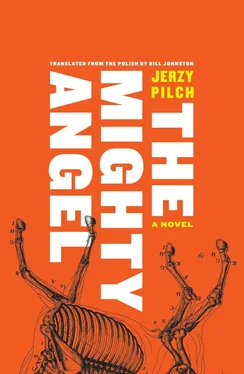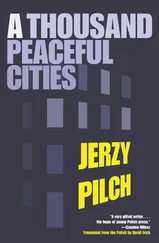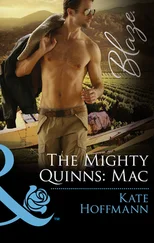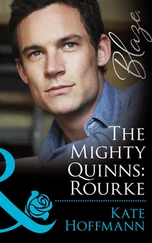“And the organic smell of my puke filled the office, and my body, choked by the puke, the stench, and the shame, fell at my boss’s feet.
“Why did this occur? Why did it happen to me, of all people? What explains the fact that I was trying to show my boss how very much I appreciated his goodwill, yet I ended up showing him the shameful contents of my bowels? More generally, the problem is as follows: how can the depths of the drunken soul be reconciled with the shallows of the drunken body? How can these things be explained and how can they be squared? How can the loftiest flights of the soul ever be equated with a fearful barfing? What black thread can join a fantastical and creative lightness with the next day’s sheets, soaked black with sweat? What is the connection between the boldness and panache of the evening and the fear and trembling of the morning? Am I, in civilian life a simple truck driver for a company delivering fruit to countries east of us, am I, a simple driver, who because of his penchant for military attire is known to his pals as the Most Wanted Terrorist in the World, am I not by any chance posing trivial questions that can be answered by any doctor, and even by any first-year medical student? I feel embarrassed to give vent so openly to my own pride, yet the answer is: no. I am asking questions of a higher order. I’m writing this novelistic treatise about addiction not to provide answers but to pose questions. And it so far-reachingly happens that I’m writing the last chapters of this treatise on an alco ward. Because my boss, seeing my puke-smothered corpse lying at his feet, immediately brought me here—”
Suddenly (suddenly! suddenly!) I felt the gentle touch of someone’s hand on my shoulder, and I experienced such a ghastly fright that not only did I break off from my writing, I didn’t even put a period at the end of the last sentence. I knew everything was up; I knew that all my counterfeit creative work had come to light. I knew it was the therapist Quasi Moses alias I Alcohol standing behind me with his hand on my shoulder. I knew that he was looking over my shoulder, that for some time now he had been following the course of my pen and had been reading what I was writing. I turned in my chair and saw his broad, congenial countenance, and I did not dare look into his eyes. I quaked like jello; I could feel, I could tangibly feel, all the symptoms of withdrawal coming back to me out of nowhere: anxiety, excessive perspiration, nausea, insomnia, hallucinations. The therapist Quasi Moses alias I Alcohol gazed at me attentively, glanced back at the written page, which I did not even attempt to cover up, then looked at me, and said:
“I can see you’ve quieted yourself; I can see you’re working on yourself and trying to quiet yourself. That’s very good. Quieting yourself, absolute quiet, that’s the basis for everything.”
With a warm yet quiet gesture he patted me on the shoulder and, just as he had come in, he moved soundlessly out of the writing room. Automatically, with the movements of a golem, I stood up, took my cigarettes out of my pocket, left the quiet room, and headed for the other end of the hallway. As I opened the door of the smoking room I caught the last sentences of an age-long debate about the existence and nature of the relationship between physiology and the soul.
Chapter 22. Fuchs the Chestnut Mare
IT’S A FROSTY WINTER before the war. Mid-January 1932 or 1933. In the part of the world where my grandfather, Old Kubica, is right now drinking another glass of Baczewski vodka, the frosts and snows will last a long time yet. Old Kubica’s immense sheepskin coat has slipped from his shoulders; he’s wearing a white shirt with an upright collar, and a black vest. He’s hot, his blood is circulating vigorously in his veins, yet pain is radiating from somewhere. Over his heart or under his lungs is an intramuscular or intercostal gap — a wound that cannot be healed.
At the Blackbird pub darkness prevails: there’s only a faint shaft of light from an oil lamp on the bar, only the red-hot iron door of the tiled stove glowing like the insignia of the god of war, only a distant white brightness gleaming through the window. The proprietor, who is stacking glasses on the shelves of a dresser, glances into a dark corner. Old Kubica is sitting motionless; that is to say, he sits motionless for a quarter of an hour, then after a quarter of an hour a faint movement of the arm can be seen, there is a soft chink of glass, and his head tips back. My grandfather Old Kubica is drinking and he doesn’t know what to do. He’s fighting off thoughts of his debts, his farm, Grandmother Zofia, his children. He doesn’t even think about his favorite chestnut mare, who has the male name of Fuchs. He’s thinking rather that in the early morning he’s going to have to kill the merchant from Ustroń to whom, earlier today, he sold the chestnut mare called Fuchs.
“I tell you, Mr. Kubica, it’s the most beautiful horse I’ve ever seen in my life. It’s the most beautiful horse in the world,” the merchant has been repeating to him for more than six months. “Mr. Kubica, Marshal Piłsudski’s chestnut mare can’t hold a candle to your chestnut mare. Name your price; for what I pay you, you’ll be able to build a new house.”
Old Kubica would smile, stroke the horse’s mane, and listen to it stamping its feet, snorting, neighing; his head was raised like an orchestral conductor listening to perfectly played music, like a drunkard drinking his glass of delight.
Early this morning his hands had been trembling and his heart pounding irregularly, while his brow was bathed in sweat, and insistent thoughts roared in his head: everything is lost, everything is gone, all is wasted. The bailiff will come, and he’ll have to take his woman and his child and move out.
In the room where he slept it was perhaps thirty, perhaps twenty-five degrees fahrenheit. He was standing at the window; waves of heat and cold struck him in turn. He rested his forehead on the frost-covered pane, gazing at the empty yard in front of the house, gazing at the path that my ten-year-old father had diligently swept clean of snow, down which the merchant was approaching.
“He must have gotten up early,” Old Kubica whispered to himself, and for a moment he thought about how people who get up early, wash in ice-cold water, eat scrambled eggs and bacon, drink hot coffee, then hitch their horses to a sleigh, cover themselves in blankets, and ride in absolute silence and whiteness the whole six miles from Ustroń to Wisła — that such people must be happy, that they must not feel pain. Maybe he himself should hitch up and head out for nowhere in particular? My proud grandfather grimaced in disgust and was annoyed at himself for entertaining such women’s notions. “Head out for nowhere in particular? Where on earth would I go?” He gave a sour smile. “Except to the pub.”
“Right,” he murmured, “the furthest I’d get would be the pub in Ustroń.”
The merchant was standing in the doorway, his hands spread in a half-hearted gesture, a smile of collusion on his face.
“Mr. Kubica. .”
“All right,” grandfather interrupted him. “What you said, and another twenty zloties.”
The other man immediately reached for his wallet.
“And one more thing.” The merchant’s smooth hand paused amid the folds of his warm jacket. “The money today, the horse tomorrow. Come back tomorrow at the same time.”
The merchant was about to say something, but the expression on my grandfather’s face must have been such that he said nothing. He dug around much less briskly in his pockets, and eventually pulled out a wad of banknotes.
“I’ll bring the extra twenty tomorrow,” he said in a voice so wan it seemed the longed-for transaction that was finally taking place had suddenly ceased to interest him. “I trust you, Mr. Kubica — everyone hereabouts knows you to be a man of his word.”
Читать дальше












